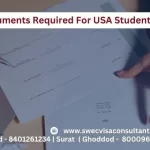Table of Contents
Applying for a UK student visa is a crucial step for anyone planning to study in the UK. To help you through this process, we’ve compiled a detailed guide on the necessary documents and steps involved.
UK Student Visa Application: Key Points
Initial Steps: Before applying for a UK student visa, you must have an acceptance letter from a UK university, also known as a Confirmation of Acceptance for Studies (CAS). Students should apply for their visa by six months after receiving their CAS. Typically, visa decisions are made within three weeks of the application submission.
Important Update: Recent changes in UK visa regulations state that international students enrolled in non-research master’s degree programs are no longer allowed to bring their dependents to the UK.
Who Can Apply for a UK Student Visa?
To be eligible for a UK student visa, you must:
- Be Over 16 Years Old: If you are under 18, you must have parental consent.
- Have an Offer for an Eligible Course: You need a confirmed enrolment in an eligible course (details below).
- Have Financial Resources: You must have sufficient funds to cover your tuition and living expenses.
- Meet English Language Proficiency Requirements: You need to demonstrate an adequate level of English.
Course Eligibility for a UK Student Visa
Not all courses qualify for a UK student visa. The course must be offered by a licensed educational institution (sponsor). You need to include a Confirmation of Acceptance for Studies (CAS) number from your chosen institution with your visa application to prove your sponsorship status.
Acceptable Courses for a UK Student Visa:
Full-Time Courses:
- Undergraduate Qualification or RQF Level 3, 4, 5:
- Must include a minimum of 15 hours of daytime study per week.
- Degree or Higher Qualification or RQF Level 6, 7, 8:
- These are standard university degree programs such as bachelor’s, master’s, and doctoral degrees.
- Equivalent to a UK Higher Education Course or Part of a Long-Term Overseas Course:
- Programs that are recognized as equivalent to UK higher education or part of an extended overseas course.
Part-Time Courses:
- Higher than Degree Qualification or RQF Level 7 and Above:
- These include advanced postgraduate qualifications pursued on a part-time basis.
Other Eligible Programs:
- Recognised Postgraduate Foundation Programme for Doctors or Dentists:
- Specific preparatory courses for medical and dental postgraduate studies.
- English Language CEFR Programme at B2 Level or Higher:
- English language courses that meet the Common European Framework of Reference (CEFR) B2 level or above.
- Full-Time Position as Student Union Sabbatical Officer:
- Positions involving significant student representation and administrative responsibilities.
Eligibility Criteria for a UK Student Visa
To be eligible for a UK student visa, you must meet the following criteria:
- Unconditional Offer: You must have received an unconditional offer from a licensed Tier 4 sponsor.
- Financial Stability: You must have sufficient funds to cover your tuition and living expenses.
Steps to Apply for a UK Student Visa
Here’s a step-by-step guide to applying for a UK student visa:
- Visit the Official UK Visas & Immigration Website: Complete your application online.
- Pay the Visa Fee and Health Surcharge: The application fee is £490, and the annual health surcharge is £776, if applicable.
- Book Your Visa Appointment: Schedule your visa appointment and print your application form along with the appointment confirmation.
Note: You can apply for your visa up to three months before the start of your course.
Required Documents for a UK Student Visa
Securing a UK student visa involves careful preparation and submission of specific documents. Here’s a comprehensive guide to the key documents you need to gather for your UK student visa application.
1. Valid Passport
Your passport or travel document must be valid and not expired. Ensure that it includes at least one blank page for the visa stamp.
2. Confirmation of Acceptance for Studies (CAS)
A critical document in your UK student visa application is the CAS number, which stands for Confirmation of Acceptance for Studies. This reference number, provided by your UK educational institution, confirms your unconditional admission and the university’s endorsement of your visa application.
Obtaining Your CAS Number:
- Once you confirm your place in the program, the university applies for your CAS number from the UK Visa and Immigration Office (UKVI).
- You may need to submit various documents to your university, including your degree certificate, academic transcripts, proof of financial resources, tuberculosis test certificate, and ATAS certificate (if applicable).
Key Points About CAS:
- You receive the CAS as a digital document after paying any required fees.
- For multiple courses, a combined CAS number will be issued.
- The CAS number is valid for six months, and it must be used within this period.
- Each CAS number can only be used once, and it is not transferable.
3. ATAS (Academic Technology Approval Scheme) Certificate
For certain sensitive programs, such as advanced science and technology courses, an ATAS certificate is required. Your CAS and offer letter will specify if you need this certificate. Apply for ATAS clearance through the UK Foreign and Commonwealth Office’s website.
Key Points About ATAS:
- The ATAS certificate is valid for six months and may take 30 days or longer to process.
- Changes to your course content or an extension of your course duration may necessitate a new ATAS certificate.
4. Academic Certificates
You need to provide evidence of your academic qualifications as detailed in your CAS. This includes transcripts or certificates of your previous education.
Requirements for Academic Certificates:
- Certificates must include your full name, the title of the award, the date, and the institution’s name.
- Transcripts should display your full name, the institution’s name, the course title, and confirmation of the award.
5. Biometric Residence Permit (BRP)
If your student visa is for more than six months, you will need a Biometric Residence Permit (BRP). This permit confirms your right to live and study in the UK and includes your details, biometric information, and immigration status. You can collect your BRP within 10 days of arriving in the UK from your university or a designated Post Office.
6. Tuberculosis (TB) Test Certificate
Indian students must provide a TB test certificate, confirming that they are free from tuberculosis. This certificate must be obtained from an approved clinic or laboratory and is valid for six months from the test date.
7. Proof of English Language Proficiency
To meet UKVI requirements, you must demonstrate your English language proficiency. This is often done through an IELTS scorecard, which should be referenced in your CAS.
8. Parental Consent Letter
If you are under 18 years old, you must include a parental consent letter with your visa application. This letter must come from your parents or guardians (or the guardian with sole legal responsibility) and should state their consent for your travel, study, and visa application, including details of your accommodation arrangements in the UK.
9. Previous Sponsor Letter
If you have previously received any scholarships or funding from government or international agencies, include a consent letter from these sponsors with your application for a UK student visa.
10. Proof of Financial Resources
You must provide evidence that you have sufficient funds to cover your tuition fees and living expenses in the UK. Acceptable documents include:
- Bank statements
- Letters from bank officials
- Loan agreements
- Proof of scholarships
Financial Requirements:
- Evidence of funds to cover the cost of the first year of your chosen program.
- Proof of funds for living expenses for one year. The amount required varies based on whether you will be living in London or elsewhere.
UK Student Visa Interview
During your visa appointment, you’ll need to:
- Submit Originals: Bring your original passport, photographs, and supporting documents.
- Biometrics: Have your fingerprints scanned and your photograph taken.
- Attend an Interview: You may need to attend an online interview with a UKVI caseworker to confirm your intentions and qualifications for studying in the UK.
Possible Interview Questions:
- Why did you choose this particular course and university?
- Why do you want to study in the UK?
- Have you applied to other UK universities?
- How do you plan to finance your living, studying, and healthcare costs?
Note: Be honest in your application and interview. False declarations or forged documents can lead to a mandatory refusal of your application and a potential 10-year ban from the UK.
Arrival in the UK
When to Arrive:
- Up to 1 week before the start date if your course lasts 6 months or less.
- Up to 1 month before the start date if your course lasts more than 6 months.
Duration of Stay: The length of your stay depends on your course type and previous studies.
Conclusion
Securing a UK student visa requires careful attention to detail and thorough preparation of essential documents. Ensure you have a valid passport, CAS number, and proof of English proficiency. Additionally, provide necessary documents such as the ATAS certificate, TB test certificate (for Indian students), and proof of financial resources.
For students under 18, include a parental consent letter, and if applicable, any previous sponsor letters. Properly organizing these documents will enhance your visa application process.
Need expert help? Contact SWEC Visa for professional assistance with your UK student visa application. We’ll guide you through each step to ensure a smooth and successful application, allowing you to focus on your studies in the UK.
Frequently Asked Questions (FAQs) on Documents Required for a UK Student Visa
Q1. What is the checklist for a UK student visa?
Ans1: The checklist for a UK student visa includes a valid passport, Confirmation of Acceptance for Studies (CAS) number, proof of English proficiency, academic certificates, tuberculosis (TB) test certificate (for certain countries), proof of financial resources, a Biometric Residence Permit (BRP) if applicable, and any additional documents like a parental consent letter if under 18.
Q2. What are the documents needed for a student visa in the UK?
Ans2: Required documents for a UK student visa include your passport, CAS number, proof of English language proficiency, academic certificates, financial proof, TB test certificate (if applicable), and any additional documents like a parental consent letter for minors.
Q3. How to apply for a UK student visa step by step?
Ans 3: To apply for a UK student visa, follow these steps: 1) Gather the required documents. 2) Complete the visa application form online. 3) Pay the visa fee and health surcharge. 4) Book and attend a biometric appointment. 5) Submit your application and attend an interview if required. 6) Wait for a decision on your visa application.
Q4. How much bank balance is required for a UK student visa?
Ans4: For a UK student visa, you need to demonstrate sufficient funds to cover tuition fees for the first year and living expenses. This typically amounts to £1,334 per month if studying in London, or £1,023 per month if studying elsewhere in the UK.
Q5. Can I show FD as proof of funds for a UK student visa?
Ans5: Yes, Fixed Deposits (FDs) can be used as proof of funds for a UK student visa. Ensure that the FD is liquid that you can access the funds, and provide the relevant bank statements or certificates.
Q6. Is ITR mandatory for a UK student visa?
Ans6: Income Tax Returns (ITR) are not mandatory for a UK student visa but can be included as additional evidence of financial stability if you have them. The primary requirement is to demonstrate sufficient funds through bank statements or other financial documents.
Q7. How many bank statements are required for a UK student visa?
Ans7: Typically, you need to provide bank statements for the last 28 days to prove financial stability. However, having a history of several months’ statements can support your application.
Q8. What is the full form of CAS?
Ans8: CAS stands for Confirmation of Acceptance for Studies. It is a reference number issued by your UK institution that confirms your unconditional admission to a course.
Q9. Is SOP required for a UK student visa?
Ans9: A Statement of Purpose (SOP) is not a mandatory requirement for a UK student visa, but it may be required by some universities as part of their admission process.
Q10. What are the new rules for UK student visas in 2024?
Ans10: New rules for UK student visas in 2024 include changes in family and dependent visa permissions for non-research Master’s courses. Always check the latest updates from official UK government sources or consult with a visa expert for current regulations.
Q11. What is the 28-day rule for a UK visa?
Ans11: The 28-day rule for a UK visa refers to the requirement that your bank statements must show a balance that has been maintained for 28 consecutive days before your visa application.
Q12. Do I need proof of funds for CAS?
Ans12: While proof of funds is not required for obtaining a CAS, you must demonstrate sufficient financial resources when applying for your UK student visa.
Q13. How much PTE score is required for a UK student visa?
Ans13: The required PTE score for a UK student visa varies by university and course. Generally, a minimum score of 50-60 is required, but you should check the specific requirements of your chosen institution.
Q14. Can I use two bank statements for a UK student visa?
Ans14: Yes, you can use multiple bank statements to demonstrate financial stability for a UK student visa, provided they cover the 28 days and show sufficient funds.
Q15. How to fill out the document checklist for a UK student visa?
Ans15: To fill out the document checklist, ensure you include all required documents such as your passport, CAS number, proof of English proficiency, financial evidence, and any other supporting documents. Follow the specific guidelines provided by UK Visas and Immigration (UKVI).
Q16. Is a 3-month bank statement enough for a UK student visa?
Ans16: For a UK student visa, a 3-month bank statement is typically acceptable if it meets the 28-day rule and shows sufficient funds. Ensure your statement covers the required period and is comprehensive.
Q17. What is the minimum bank balance for a UK student visa?
Ans17: The minimum bank balance required for a UK student visa is enough to cover your tuition fees and living expenses. Generally, this means having £1,334 per month for London or £1,023 per month for other parts of the UK for the duration of your stay.
Q18. What do UK visa officers check?
Ans18: UK visa officers check your application for accuracy, review your supporting documents, assess your financial stability, and verify your genuine intent to study. They may also review your English language proficiency and academic qualifications.
Q19. Can I show my parent’s bank statement for a UK student visa?
Ans19: Yes, you can use your parent’s bank statement as proof of funds for a UK student visa. You will need to provide evidence of your relationship and a parental consent letter if you are under 18.
Q20. Can CAS get rejected?
Ans20: Yes, CAS can be rejected if you do not meet the admission requirements of your UK institution, provide incorrect or incomplete information, or fail to pay any required deposit.
Q21. How much does a CAS cost?
Ans21: The cost of obtaining a CAS varies by institution. Some universities may charge a fee for issuing a CAS, while others may include it as part of their tuition fees. Check with your institution for specific details.
Q22. Is a PCC required for a UK student visa?
Ans22: A Police Clearance Certificate (PCC) is not typically required for a UK student visa unless specifically requested by the visa authorities or your university.
Q23. What is the 7-year rule for a UK visa?
Ans23: The 7-year rule generally refers to the requirement for providing a detailed history of your residence and activities over the past seven years, particularly for long-term visas or immigration applications.
Q24. What is the age limit for a UK student visa?
Ans24: There is no specific age limit for a UK student visa, but if you are under 18, you will need to provide additional documentation such as a parental consent letter.
Q25. How many years to get PR in the UK?
Ans25: The path to Permanent Residency (PR) in the UK typically involves living in the country for 5 years on a qualifying visa, such as a Tier 2 work visa or other eligible visas, and meeting specific residency and employment criteria.
Q26. Can I use my father’s bank statement for a visa?
Ans26: Yes, you can use your father’s bank statement as proof of funds for a UK visa. Ensure you also provide documentation to prove your relationship and any required consent letters if you are under 18.






